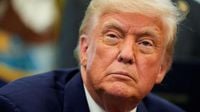In a controversial move that has raised alarms among legal experts and civil rights advocates, the Trump administration is reportedly considering suspending habeas corpus, a fundamental legal principle that allows individuals to challenge their detention in court. This potential action was confirmed by Stephen Miller, the White House deputy chief of staff, who stated on May 9, 2025, that the administration is "actively looking at" the suspension as a means to address what they describe as an ongoing national security threat posed by undocumented migrants.
The Constitution permits the suspension of habeas corpus only in extraordinary circumstances, specifically during times of rebellion or invasion, as outlined in Article I. Historically, the United States has invoked this measure four times: during the Civil War, in Reconstruction-era South Carolina, during a 1905 insurrection in the Philippines, and again in Hawaii following the attack on Pearl Harbor in 1941.
Miller justified the administration's consideration by claiming that the current influx of undocumented migrants constitutes an "invasion," which he argues provides the legal grounds for such a drastic measure. This line of reasoning echoes Trump's earlier invocation of the Alien Enemies Act, which aimed to expedite the deportation of alleged gang members from Venezuela without due process. However, federal judges have already ruled against this invocation, stating the administration failed to demonstrate that the United States is being invaded by a hostile entity.
"The Constitution is clear, and that, of course, is the supreme law of the land, that the privilege of the writ of habeas corpus can be suspended in time of invasion," Miller remarked. Yet, legal scholars argue that the president cannot unilaterally suspend habeas corpus without Congressional approval. Georgetown University Law Center professor Steve Vladeck emphasized this point, writing in his Substack blog that, "Miller also doesn't deign to mention that the near-universal consensus is that only Congress can suspend habeas corpus -- and that unilateral suspensions by the President are per se unconstitutional."
President Abraham Lincoln's suspension of habeas corpus during the Civil War serves as a historical precedent, but even then, it was met with legal challenges. Chief Justice Roger Taney deemed Lincoln's actions unlawful, highlighting that the authority to suspend such rights lies within Congress, not the executive branch. As the Trump administration explores this contentious path, the implications for due process and civil liberties are profound.
In private discussions, Trump has been reportedly involved in considerations surrounding the suspension of habeas corpus, particularly as a response to nationwide injunctions that have obstructed his administration's immigration policies. On April 30, 2025, Trump hinted at potential measures to counteract these judicial barriers, stating, "There are ways to mitigate it and there’s some very strong ways. There’s one way that’s been used by three very highly respected presidents, but we hope we don’t have to go that route." Although he did not specify that he was referring to habeas corpus, the timing and context suggest a correlation.
Legal experts have voiced concerns that such a suspension would eliminate the courts' ability to rule on immigration matters, fundamentally undermining the judicial system's role in checking executive power. CNN senior legal analyst Elie Honig expressed that Miller's assertions about suspending habeas corpus are fundamentally flawed, arguing, "The Constitution makes clear that suspension of habeas corpus is to be reserved for actual rebellion or invasion posing the most dire threats to public safety. And Congress has never passed a law authorizing deportations without any court involvement, as Miller suggests."
As the Trump administration continues to grapple with legal challenges regarding immigration enforcement, officials have also explored the possibility of designating certain suspected cartel and gang members as "enemy combatants." This designation would ostensibly facilitate their detention and complicate their ability to contest their imprisonment. Such measures, if implemented, would represent a significant departure from established legal norms.
In light of these developments, Chief Justice John Roberts recently emphasized the importance of judicial independence during a public event in Buffalo, New York, stating that the judiciary serves as a coequal branch of government with the authority to interpret the Constitution and check the excesses of both Congress and the executive. His remarks underscore the ongoing tensions between the Trump administration and the judiciary, as officials have increasingly criticized court rulings that have thwarted their immigration agenda.
As discussions around suspending habeas corpus unfold, the broader implications for American democracy and the rule of law are at stake. The potential for executive overreach in matters of immigration raises critical questions about the balance of power in the U.S. government and the protection of civil liberties for all individuals, regardless of their immigration status.
As the situation develops, it remains unclear whether the Trump administration will pursue the suspension of habeas corpus or if such a move would withstand judicial scrutiny. However, the mere consideration of this action reflects a significant shift in the administration's approach to immigration policy and the lengths to which it may go to assert its authority.
In a rapidly evolving political landscape, the ramifications of these discussions will likely reverberate through the courts and the public discourse, as advocates for civil rights and legal experts continue to challenge the administration’s interpretation of constitutional powers.




